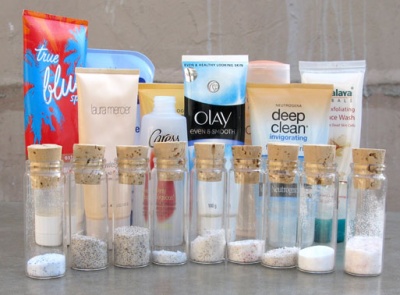EAC launches microplastic inquiry
 The Environmental Audit Committee (EAC), Parliament’s green watchdog, has launched an enquiry on the environmental impact of microplastics by calling for written evidence on the subject.
The Environmental Audit Committee (EAC), Parliament’s green watchdog, has launched an enquiry on the environmental impact of microplastics by calling for written evidence on the subject.
The use of microbeads, tiny bits of plastic less than five millimetres wide, mainly made from polyethylene (PE), in cosmetics will be phased out in the United States after President Barack Obama signed the Microbead-Free Waters Act in December.
The act will see synthetic plastic microbeads in cosmetics phased out from July 2017, with a complete ban to be enforced from 1 January 2018. Green Party Leader Natalie Bennett is among those calling for a similar ban to be introduced in the UK, telling the Independent last year that ‘the evidence is clear and unequivocal: microbeads in cosmetics products are ending up in our waters, in our sealife, and in our own bodies, with pesticides and other chemicals attached’.
Microbeads are often used as exfoliants in cosmetic products like face wash and toothpaste. Due to their size they are able to slip through water filtration systems and often end up in waterways.
The EAC is calling for written evidence from stakeholders regarding a number of questions including how microplastics impact on marine plants and animals, what economic consequences could result from their increased pollution of oceans, and their impact on human health.
Knock-on impacts on government policies, solutions for mitigating microplastic pollution and the quality of existing research into microplastics and their effect will also be investigated in the written evidence portion of the inquiry.
Written evidence must be received by the EAC by 5pm on 15 April.
Microplastics
As well as cosmetics, microplastics are also found in fibres from clothes and particles from tyres, and are used in abrasive sandblasting. Microbeads do not biodegrade, and a study published for the Convention on Biological Diversity found that around 35 per cent of fish have microplastics in their stomachs. While some fish can excrete plastic, others cannot, causing it to accumulate in their bodies.
In addition, research carried out by International Pellet Watch has suggested that their surface can absorb organic pollutants such as PCBs and DDT from the marine environment. These can then be passed on to animals ingesting the plastic. Research is currently being undertaken by the National Oceanic and Atmospheric Administration (NOAA) in the US to determine whether microplastics affect the health of this marine life and if the chemicals then transfer to humans eating polluted wildlife.
 Photo: 5 Gyres
Voluntary action
Photo: 5 Gyres
Voluntary action

A number of UK retailers have already pledged to phase out plastic microbeads from their own-brand cosmetic and beauty products. Unilever announced in 2012 that all of its products worldwide would be plastic-free by 2015, while Colgate-Palmolive, which is behind the Colgate, Sanex and Palmolive brands of toothpastes and soaps, has also voluntarily removed microbeads from its products.
Marks & Spencer and Boots in the UK both promised to end production by the end of 2016, while manufacturers L'Oréal, Johnson & Johnson and Reckitt Benckiser have all said they will stop using microbeads by 2017.
Looking at health consequences
Environmental Audit Committee Chair Mary Creagh MP said: “Microplastic beads are used in industrial processes and body care products. Their tiny size means they can end up flushed into the sea and enter the food chain. The Environmental Audit Committee is launching an inquiry today to investigate the scale of the problem.
“We will be looking at the health consequences of eating fish containing microplastics and the extent of the damage to our ecosystems. We hope to discuss potential solutions with industry, environmental and consumer groups.”
More details on the EAC inquiry into microplastics can be found on the committee’s website.






